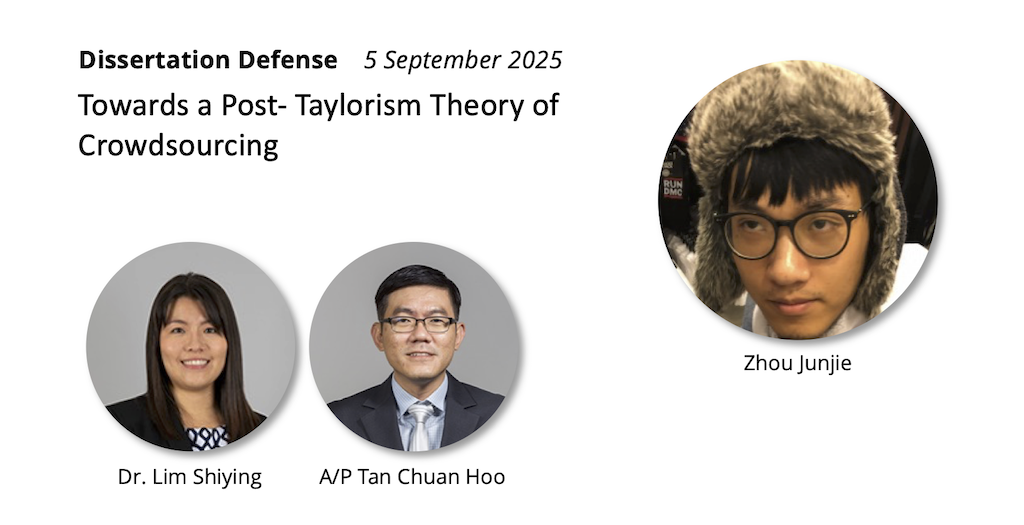
PhD Defense – Zhou Junjie
Date/Time/Venue: 5 September 2025 @ 3:00PM @ COM2-MR3
Dissertation Title: Towards a Post- Taylorism Theory of Crowdsourcing
Abstract:
Crowdsourcing is rapidly becoming a mainstream innovation tool for firms. However, despite its wide adoption, crowdsourcing often fails to deliver the desired outcomes in practice. This dissertation seeks to examine how to fully leverage the innovativeness of crowdsourcing. I argue that existing studies and theories of crowdsourcing have been deeply rooted in the management paradigm of Taylorism and overlook the roles of knowledge (re)combination, contextual complexity, and measures of crowdsourcing effectiveness. While this theoretical perspective is valid in certain contexts, it might be ill-suited to guide the use of crowdsourcing for complex problem-solving.
This dissertation consists of two essays that, combined, aim to develop a post-Taylorism theoretical perspective of crowdsourcing that incorporates these important but neglected elements. The first essay entitled “Making the Crowd Wiser: (Re)combination through Teaming in Crowdsourcing” examines the (re)combination among solution solvers (i.e., the crowd) via teaming — i.e., team formation on the fly. Although teams, when properly structured and composed, are expected to generate higher quality solutions compared to individual solvers, simply allowing teaming in crowdsourcing may not necessarily enhance global crowdsourcing effectiveness as team formation during crowdsourcing would shift the distribution of quality of all discovered solutions. I develop an agent-based simulation model, calibrated by empirical data from an online crowdsourcing platform, to examine whether and to what extent teaming could enhance the likelihood of finding high quality solutions for the solution seeker. I present a theoretical framework that identifies the underlying mechanisms of how teaming influences overall crowdsourcing effectiveness. The framework is used to explore the impact of teaming in generalized crowdsourcing environments.
The second essay entitled “The Cave of Crowdsourcing: A Systems Investigation of Crowdsourcing Effectiveness” focuses on the knowledge re(combination) between solution solvers (i.e., the crowd) and the solution seeker (i.e., the firm). To utilize crowdsourcing beyond its existing knowledge base, the firm must evaluate and select from the crowd’s solutions. However, this evaluation can be biased by the firm’s existing understanding. I conceptualize crowdsourcing as a system constrained by the seeker firm’s existing knowledge — the system is incentivized to produce satisfactory solutions for the firm but (potentially) ineffective solutions for the crowdsourced problem. I extend the agent-based simulation model and examine how the knowledge flows between the solution solvers and the seeker firm within the crowdsourcing system influences the system’s performance in discovering solutions with absolute high quality. I identify two paradoxes in crowdsourcing. First, the crowdsourcing system is most likely to overlook high quality solutions developed by the solvers when they are most needed. Second, when the seeker firm provides feedback, although the seeker firm perceives the adopted solution as of higher quality, the absolute performance may be poor. To resolve these paradoxes, I examine how the seeker firm could leverage the wisdom of the crowd and learn from the crowd about what design choices constitute a good solution.
Taken together, these two essays contribute to the literature on crowdsourcing by proposing and developing a post-Taylorism perspective on crowdsourcing. The overall contributions are twofold. First, this dissertation enhances our understanding of how two distinct types of knowledge (re)combination influence crowdsourcing outcomes. Second, this dissertation proposes a methodology for measuring and comparing global crowdsourcing effectiveness across varying contingencies.
Keywords: Crowdsourcing, crowdsourcing contests, crowdsourcing effectiveness, knowledge (re)combination, teaming, firm knowledge, knowledge absorptive capacity, NK fitness landscapes model, simulation
